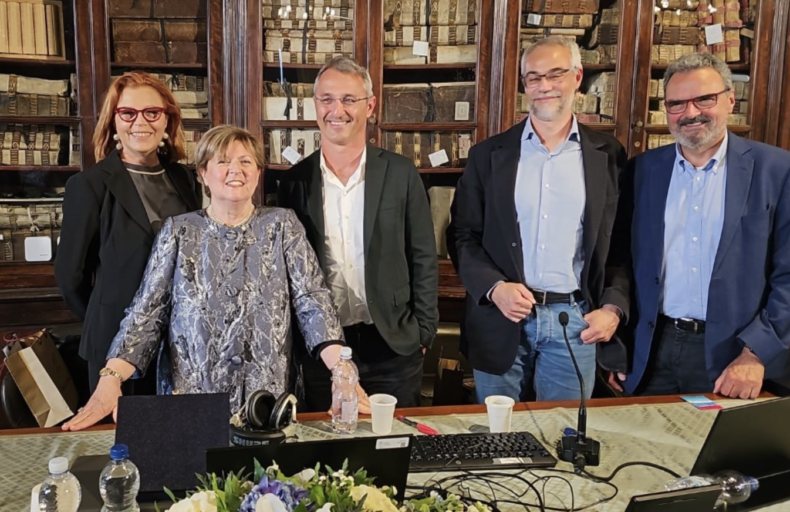Adei Wizo award to Eshkol Nevo: “Re-humanizing words, the task of us writers”

“The commitment of this award is more necessary than ever in order to make people aware of our world, without those filters and distortions that are difficult to extirpate even in unsuspecting people. But also by reading what the students in the children’s session wrote to us, I would say that we do are taking some steps in the right direction”. Susanna Sciaky, national president of Adei Wizo, drew a more than positive balance of the situation when she inaugurated the conclusive ceremony of the 23rd literary prize, which is awarded yearly by the Association of Italian Jewish Women and titled in remembrance of Adelina Della Pergola.
Not a single seat was free in the blue room of the Scuola Normale in Pisa, full of students listening and clapping. At the head table were Eshkol Nevo and Andrea Molesini, while in connection on screen were Ayelet Gundar Goshen, Yigal Leykin and Max Gross. Among the speakers were the director of the Scuola Normale Superiore Luigi Ambrosio, city councillor for urban planning of the city of Pisa Massimo Dringoli, culture councillor of Livorno Simone Lenzi, commander of the national gendarmerie of the Livorno Carabinieri Ugo Chiosi, president of the Jewish Community of Pisa Maurizio Gabbrielli, and president of the Livorno Community Vittorio Mosseri.
The first one to receive the recognition was Nevo, who was awarded for his novel Le vie dell’Eden (“The ways of Eden”). The Israeli writer, who was also prompted by questions from journalist Francesca Nocerino and Andrea Molesini, recalled: “The first literary prize I have ever received was this very one, for ‘Symmetry of Desires’. At the time, it was just what I needed to push me to continue this profession. I could say that today I am closing a circle”. Nevo then spoke about the role of the writer nowadays: “One of the things we can do is re-humanize and bring to life words that have been used until they became drained, which otherwise risk turning into harmless words. The writer needs to have a strong physical connection with life”.
The prize for the children’s section was awarded instead to Ayelet Gundar Goshen, with the book Dove si nasconde il lupo (“Where the wolf hides”). Explaining the genesis of the novel, the author argued: “After all, the mystery of life is not exploring our universe, but trying to figure out who the people we care about the most are. And that is the truly humanistic aspect of literature, because we all face the same problems”.
The ceremony went on with the greetings from Israel by Sergio Della Pergola, who, together with his sister Mara, keeps his mother’s memory alive through this praiseworthy contest. Andrea Molesini instead, special prize-winner of the jury, dived the audience into the historical events of the Republic of Venice in the 15th century, which he discusses in the book Il rogo della Repubblica (“The stake of the Republic”).
The day after, as is the tradition, the writers met with the school students. This year there were over 700 students from all over Italy involved in the role of jury members, who were present some days ago at the Goldonetta theatre in Livorno. They made a lot of stimulating questions to the writers, focusing mainly on family relationships and the dynamics of adolescence, which is a central theme in Israeli literature.
Translation by Martina Bandini, revised by Valentina Megera, students at the Secondary School of Modern Languages for Interpreters and Translators of the University of Trieste, interns at the newspaper office of the Union of the Italian Jewish Communities – Pagine Ebraiche.
